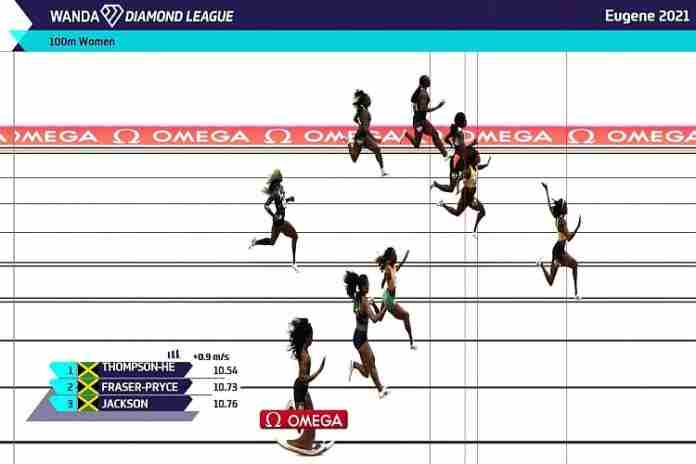(★ Friends: So many thanks to our 58 donors, who have covered our current tech support bill. If you would like to help with the next one, please donate here. So, so grateful for the support of our readers. Thank you. ★)
“Some of our athletes at the Olympic Games in Tokyo suspect that there has been performance-enhancing doping going on. One nation with a history of doping was disqualified from participating under its own flag because of past violations. We need better enforcement of anti-doping rules to make sure the Olympics are clean and that athletes are winning based on their own capabilities and training.”
That’s Rep. Steve Cohen (D-Tennessee), co-Chair of the U.S. Commission on Security and Cooperation in Europe – better known as the Helsinki Commission – on introducing a new bill in the U.S. Congress called the “Guarantee Oversight and Litigation on Doping Act” or “GOLD Act.”
The bills are H.R. 4906 in the U.S. House and S. 2632 in the U.S. Senate, barely noticed since they were introduced during the Tokyo Games on 3 August and 5 August, respectively. Each runs only 306 words and are explained as:
“It is the sense of Congress that –
“(1) the punishment of Russia for persistent decades-long state-run doping fraud by the international sport governance structure has been insufficient and Russia’s competing status as ‘ROC’ at Tokyo 2020 demonstrates to authoritarian states around the world that systematic doping will be tolerated; and
“(2) aggressive enforcement of the Rodchenkov Anti-Doping Act of 2019 (21 U.S.C. 2401 et seq.) can create the deterrent required to curb doping fraud as the Foreign Corrupt Practices Act of 1977 (15 U.S.C. 78dd–1 et seq.) curbed foreign bribery and the Department of Justice and the Federal Bureau of Investigation should prioritize enforcement of the Rodchenkov Anti-Doping Act of 2019 (21 U.S.C. 2401 et seq.).”
What the bill would do is add aiding doping to a long list of offenses which can be prosecuted under the Racketeer Influenced and Corrupt Organizations (RICO) Act of 1970. Originally created to prosecute the heads of organized crime – especially the Mafia – in the United States, its success has led to its expanded applicability to many other actions around the world. That list may now include aiding sports doping.
The bill followed a 21 July hearing on “Rodchenkov Act Enforcement at Tokyo 2021,” exploring whether Tokyo 2020 was going to be a “clean” Olympic Games. Olympic icon Edwin Moses, the two-time men’s 400 m hurdles gold medalist from 1976 and 1984 and Chair Emeritus of the U.S. Anti-Doping Agency, gave powerful testimony on the state of doping today, including:
● “[The International Olympic Committee] continues to miss, or ignore, defining moments to confront in the clearest way possible, the win at all costs culture of corruption through doping in global sport. These have all been opportunities to draw an unambiguous line in the sand: a chance to stand up for clean athletes – a chance to show clean athletes they care, to send a message, loud and clear, that this type of fraudulent behavior will not be tolerated in Olympic sport. Yet, when these decisive moments arrived, when the lights were shining brightest, [World Anti-Doping Agency] and the IOC repeatedly failed to lead.”
● “It is a question of dictators versus Democracies in the rule of law for both sport and politics. An interwoven network that allows state sponsored corruption to flourish and kleptocracies the ability to defraud athletes and corporations alike. Those that defraud sport with performance enhancing drugs do not let national borders stop them in perpetuating their crimes.”
● “One enhancement that might be worth investigating is adding the Rodchenkov Act to the U.S. Code Title 18 § 1956. As we understand it, this would allow financial transactions used in the corruption of sport under the Rodchenkov Act, involving the proceeds of specified unlawful activity, to be considered money laundering under the U.S. Code and prosecuted as such.”
This is exactly what the new bill does.
Richard Baum, the anti-doping coordinator for the U.S. Office of National Drug Control Policy, followed up with details of the investigative tools created by the Rodchenkov Act:
“The U.S. Department of Justice and its Federal Bureau of Investigation (FBI) have taken steps to address the doping and sports-related crime landscape … An Integrity in Sport and Gaming program has been developed within the FBI’s Transnational Organized Crime-Global Section.
“This unit collaborates with domestic partners like USADA, and leverages international law enforcement partnerships to disrupt and prosecute the transnational threats and corruption elements that prey on the societal institutions of sport. Further, the U.S. Department of the Treasury retains an array of tools and authorities, including targeted financial sanctions that may be directed against foreign actors involved in a wide range of corrupt international actions, including sports-related corruption and doping. In 2018, for example, Treasury’s Office of Foreign Assets Control added two officers in Russia’s Main Intelligence Directorate to its designated nationals list for their role in hacking WADA and illegally releasing athlete medical data.”
Debra LaPrevotte, a former Supervisory Special Agent in the FBI’s International Corruption Unit, added that international law enforcement efforts in anti-doping are working:
“In 2019, Interpol, led by Italian and Greek investigators, conducted Operation Viribus. This effort involved 33 countries and was a massive crackdown on trafficking in doping materials. This investigation dismantled 17 organized crime groups, led to 234 arrests and closed nine underground labs. This case identified almost 1,000 people involved in the production, commerce, or use of doping products.”
The Helsinki Commission hearing and the new bills are not being celebrated by the World Anti-Doping Agency, which has already voiced its concerns over the Rodchenkov Act, including:
“No nation has ever before asserted criminal jurisdiction over doping offences that occurred outside its national borders – and for good reason. It is likely to lead to overlapping laws in different jurisdictions that will compromise having a single set of anti-doping rules for all sports and all Anti-Doping Organizations under the World Anti-Doping Code (Code). This will have negative consequences as harmonization of the rules is at the very core of the global anti-doping system.
“WADA remains concerned that by unilaterally exerting U.S. criminal jurisdiction over all global doping activity, the Act will likely undermine clean sport by jeopardizing critical partnerships and cooperation between nations. Further, the Act could impede the capacity to benefit from whistleblowers by exposing them to possible prosecution and preventing ‘substantial assistance’ deals in line with the provisions of the Code.
“This Act may lead to other nations adopting similar legislation, thereby subjecting U.S. citizens and sport bodies to similar extraterritorial jurisdictions and criminal sanctions, many of which may be political in nature or imposed to discriminate against specific nationalities. This will be detrimental to anti-doping efforts everywhere, including in the U.S.”
The two new bills were referred to the Committee on the Judiciary on both the House and Senate side and there is no indication that either will receive priority treatment in the midst of the battle royal now going on in the Congress over other issues.
But they continue the drumbeat from the U.S. side – and U.S. athletes – that doping is unacceptable, both on the domestic and international levels. While most of the rhetoric has been aimed as Russia following its enormous state-sponsored doping program from 2011-15, watch for a potential new flashpoint in the Congress ahead of the 2022 Olympic Winter Games in Beijing if any evidence of doping in China is brought forward ahead of next February’s winter festival. Stay tuned.
Rich Perelman
Editor
You can receive our exclusive TSX Report by e-mail by clicking here. You can also refer a friend by clicking here, and can donate here to keep this site going.
For our 649-event International Sports Calendar for 2021 and beyond, by date and by sport, click here!




























